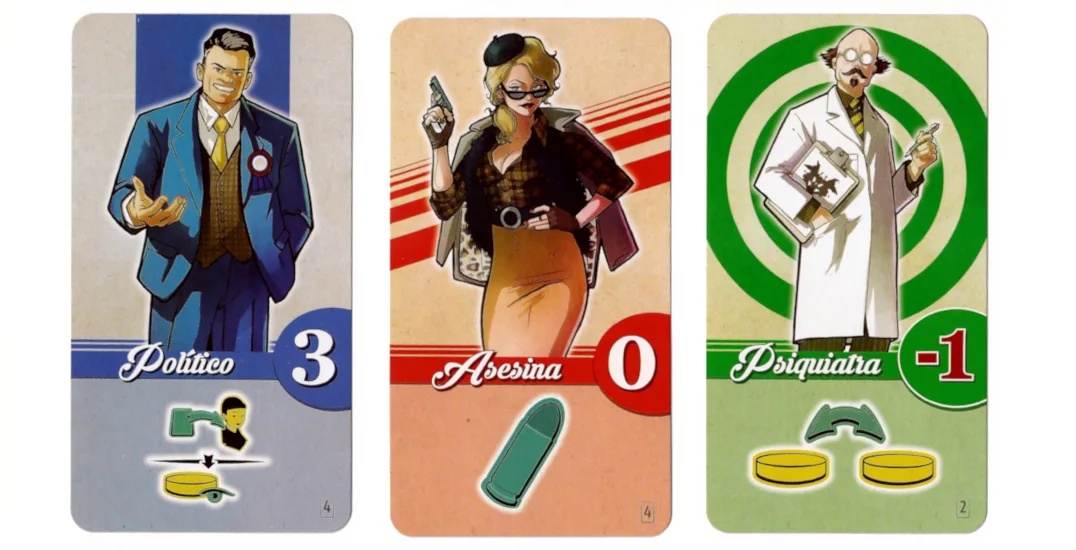
Few would consider Secrets to be one of the best designs made by Eric M. Lang or his codesigner from my side of the pond, Bruno Faidutti. And yet, this lesser game of social deduction has managed to hit my table more than thirty different times. As players change sides, flip cards and betray their countries in order to become hippies, its flaws might be hard to ignore, but the fun of the resulting experience is also undeniable.
TWO (AND A HALF) SIDES
In Secrets players are secretly given three different identities. Two of them, the CIA and the KGB, win if their team has the most points. The third, the Hippies, don’t work together and aren’t even interested in points. Rather, they win as long as they alone stand as the lowest scoring player at the table. All easier said than done, as nobody knows who’s who and loyalties change at a moment’s notice.
During their turn, players take the top two cards from a deck of characters. Each has a different ability, from the Double Agent, which changes our identity, to the Politician, who lets us bribe another player to see which side they are on. Characters have a different amount of points as well, so you are incentivized to find your teammates quick so you can get them the right cards.
That requires some work, though. Depending on the player count, we might not know what role anyone has. At best, we might know one out of five or two out of seven. And that’s not taking into account the additional identity that is placed on the center of the table. The table dynamics, down to the number of players on each team, can change completely as that piece is switched with the one held by a player or even just revealed.
The trick is that players don’t play cards directly. Rather, they only offer them to each other. And, to make things harder, they are offered facedown. It’s up to the recipient to choose if they want to keep it, or if the risk of getting the wrong one is too high to hold. Getting the right cards, to the right people makes all the difference.

After all, it’s the only way to understand where loyalties lie. Building trust and forcing characters upon each other to deduce roles is the core of the game. You might know that someone has two thirds of a chance to be on your team and that another trusts him, how do you navigate that? You may not even know what team you are in yourself! Managing that mixture of hidden information, truth and chaos is beautiful.
Thankfully, we are always sure of two things. The first is that you may not know what team you are on, but you must always be on yours. The second is that you have teammates, who might know who you are, and can help you out. Balancing attacks towards the other team, collaborating with your friends and switching sides creates fantastic table dynamics that are a riot to be on.
CHAOS AND CONTROL
Wild table dynamics can create an exhilarating experience. Yet, they are a difficult beast to tame. The more chaos, hidden information and trickery a game has, the more robust its mechanics should be. Sadly, the mechanics of Secrets aren’t up to the task. They stumble under pressure and often leave players without the ability to control their own destiny.
The way cards are drawn and used has a couple flaws. There are clear advantages to accepting a card and few to refuse. The first cards are given practically at random, as nobody has the necessary information to cooperate. The United Nations, which allows the player with the least cards to snatch them from others, is a clear band-aid, lest one player not receive cards at all.
More importantly, I’m still not sure how much control players actually have. On one hand, the randomness and chaos are compensated by being part of a team. You can rely on your friends to help you out and figure out the right strategy together. On the other, a chunk of games end with a last-minute swap or other unpredictable trick. Everyone’s roles can also be revealed too quickly, rendering the match moot.

How much that matters is highly personal. Secrets straddles the line, perhaps not too comfortably, between serious deduction and silly party game. For me, the complex table dynamics compensate for the occasional dud and overall lack of control. For others, being shuffled from team to team will be too much to bear. There could have been ways to content both camps, but Secrets is not at that level.
NOT ALL IS LOST
Despite its flaws, I’m fond of Secrets. After each game, players always share their stories of who they thought was on their team and who wasn’t. There’s a bit of “Ah, I thought this”, “I knew you would take the card” and even “I shouldn’t have changed sides”, which is just lovely. It’s easy to get on the table and matches are short enough that it’s easy to give it two or three tries.
Most importantly, Secrets is one of the very few games of secret identities that plays well at 4 players. At that count, scoring is quite tight. Ending the game at the right moment without allowing the hippie to win is quite the challenge. It’s also great at 6, at which point it becomes more heavily based on social interaction and recognizing all three members of your team.
While it works at higher counts, at 7 or 8 it becomes less about social deduction and more about convincing others what team they are – or should be on. The degree of control goes down and downtime between turns becomes a problem. Still, don’t discount odd player counts. Having two hippies instead of just one is funny, because they don’t actually belong to the same team. Only one of them will be able to win.
The plastic tokens used for the identities gives the game some durability. This might seem minor, but shuffling, changing and hiding the tokens would let scuffles on a softer material. The pinup style art and the inherent comedy to many of the cards are a niche touch, too, though the surprisingly attractive Thatcher lookalike worries me.

Ultimately, I recognize Secrets may not be the best design in the market. But it has something unique going for it. It has great social dynamics and the ever changing teams are a nice touch. It doesn’t get everything right, but there’s no need for it. It has its own appeal, which is more difficult to find than a better, if more conventional, design.
| SECRETS (2017) | |||
|---|---|---|---|
| DESIGN | Bruno Faidutti Eric M. Lang | ART | Cari |
| PUBLISHER | Repos Production Asmodee | LENGTH | 15 minutes |
| NUMBER OF PLAYERS | 4-6 (Best with 4-6) | SCORE | ★★★ |



